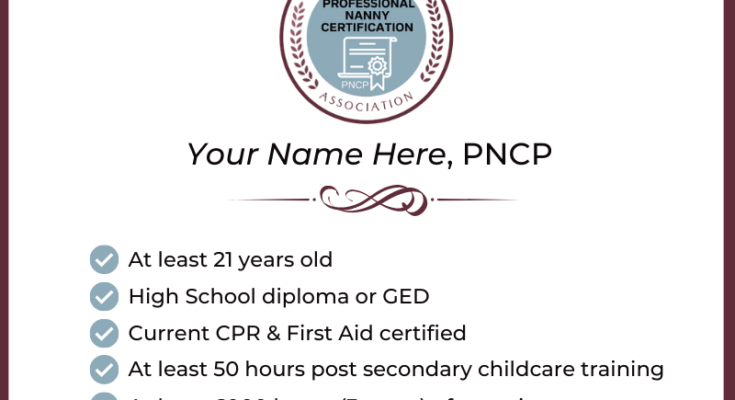In today’s fast-paced world, the demand for professional childcare services has grown significantly. Parents increasingly seek trained and certified nannies to ensure the safety, development, and well-being of their children. Professional nanny certification programs play a vital role in enhancing the quality of childcare services. This informative article explores the world of professional nanny certification, highlighting its importance, the requirements, and the benefits it offers to both nannies and the families they serve.
The Evolution of Nannyhood
Nannies, once referred to as governesses, have been a part of domestic life for centuries. Historically, they were primarily responsible for educating and caring for the children of nobility and aristocrats. Over time, the role of nannies has evolved significantly. Nannies now come from diverse backgrounds and provide invaluable services in childcare.
In the past, nannies often learned their trade through experience and word of mouth. However, as society’s expectations of childcare have evolved, so have the qualifications and standards for those entrusted with this crucial responsibility.
Importance of Professional Nanny Certification
- Child Safety and Development
Professional nanny certification programs emphasize the safety, health, and developmental needs of children. Nannies who undergo formal training learn how to create a safe environment, recognize and respond to emergencies, and foster children’s physical, emotional, and intellectual development.
- Enhanced Childcare Skills
Certification programs cover a wide range of topics, from nutrition and first aid to early childhood education. Nannies gain practical skills and knowledge that enable them to provide a higher level of care to the children they look after.
- Trust and Confidence
Certification provides families with a sense of security and peace of mind. Knowing that a nanny has undergone formal training and met specific standards makes parents more confident in their choice, ultimately strengthening the caregiver-family relationship.
Professional Nanny Certification Requirements
To become a certified professional nanny, individuals must meet specific requirements. These requirements typically encompass a combination of education, training, experience, and professional conduct. Let’s explore the most common certification requirements in detail:
- Education
Many certification programs require candidates to have a high school diploma or equivalent. Some programs may have additional educational prerequisites, such as coursework in early childhood education or child development.
- Training
Certification programs often include formal training in childcare, child safety, nutrition, and first aid. Nannies learn how to address common childhood challenges and emergencies effectively.
- Experience
Professional nanny certification usually demands a certain amount of experience. The minimum experience requirement can vary, but it typically ranges from a few hundred to several thousand hours of documented childcare experience.
- Background Check
Applicants may undergo a thorough background check, which includes criminal history and reference checks to ensure the safety and well-being of the children they will care for.
- Certification Exam
Certification programs often require candidates to pass an examination that assesses their knowledge and skills in various aspects of childcare. The exam may cover topics like child development, safety, and ethical conduct.
Benefits of Professional Nanny Certification
Professional nanny certification offers numerous benefits to both nannies and the families they serve:
Benefits for Nannies
- Skill Enhancement
Nannies who pursue certification gain valuable knowledge and practical skills that enable them to provide superior care to the children they look after. They are better equipped to handle emergencies, create enriching learning environments, and address children’s unique needs.
- Career Advancement
Certification can open doors to more prestigious and higher-paying nanny positions. It demonstrates a commitment to professionalism, which is highly valued in the industry.
- Confidence and Job Satisfaction
Certified nannies often report higher levels of confidence and job satisfaction. They know they are well-prepared for their responsibilities, which leads to increased self-assurance and overall happiness in their work.
- Networking Opportunities
Many certification programs provide opportunities for nannies to connect with others in the field. This networking can lead to valuable relationships and professional growth.
Benefits for Families
- Quality Assurance
Families can have confidence in the skills and knowledge of certified nannies. This assurance is particularly vital when entrusting someone with the well-being of their children.
- Peace of Mind
Certified nannies are trained to respond to emergencies and handle various childcare challenges. This equips parents with peace of mind, knowing their children are in capable hands.
- Child Development
Certified nannies are well-versed in early childhood development, which means they can actively support a child’s growth and learning. This aligns with the educational and developmental goals parents have for their children.
- Professionalism
Certified nannies often exhibit a high degree of professionalism in their work. They understand the importance of punctuality, communication, and ethical conduct, contributing to a positive caregiver-family relationship.
Professional Nanny Certification Programs
There are several certification programs available for aspiring nannies. Each program may have slightly different requirements and areas of emphasis. Here are a few prominent ones:
- International Nanny Association (INA) Certification
The International Nanny Association offers the INA Nanny Credential Exam. This certification covers various aspects of childcare, including child development, nutrition, safety, and professionalism.
- Newborn Care Specialist Certification
For nannies specializing in newborn care, there are programs like the Newborn Care Specialist Certification. These programs focus on the unique needs of infants and their families.
- American Council on Professional Nanny Certification (ACPN)
ACPN offers a certification program for professional nannies, which includes coursework in child development, nutrition, safety, and professionalism. Applicants must also pass an exam.
- Child Development Associate (CDA) Credential
The CDA credential is widely recognized in the childcare industry and is suitable for nannies working with young children. It emphasizes the importance of observing and supporting children’s development.
- Red Cross Babysitting and Child Care Certification
The American Red Cross offers certification programs specifically designed for babysitters and childcare providers. These programs cover emergency response, childcare basics, and safety.
Challenges in Nanny Certification
While professional nanny certification offers numerous benefits, it also presents some challenges:
- Cost
Certification programs often come with fees, and not all aspiring nannies can afford the expense. However, some organizations and agencies may offer financial assistance or scholarships to help individuals pursue certification.
- Accessibility
Certification programs are not universally available, which can limit access for individuals in certain geographical areas. Online options have become more common, making certification more accessible to a broader audience.
- Time Commitment
Completing certification programs can be time-consuming, and nannies may need to balance their studies with work and personal responsibilities. However, many programs offer flexible schedules to accommodate working professionals.
- Changing Regulations
Nanny certification standards and regulations can vary by location and may change over time. Nannies must stay informed about any updates to remain compliant with local and national requirements.
Also Read: Global Travel Professional Certification
Conclusion
Professional nanny certification programs play a crucial role in elevating the standards of childcare services. They provide nannies with essential skills and knowledge, enhancing their ability to care for and support the development of the children under their charge. Families benefit from the peace of mind that certified nannies bring, knowing their children are in capable hands.
As the demand for high-quality childcare continues to grow, professional nanny certification will likely become an increasingly important credential in the industry. Nannies who invest in their education and training not only open doors to better job opportunities but also make a lasting, positive impact on the lives of the children they care for.




